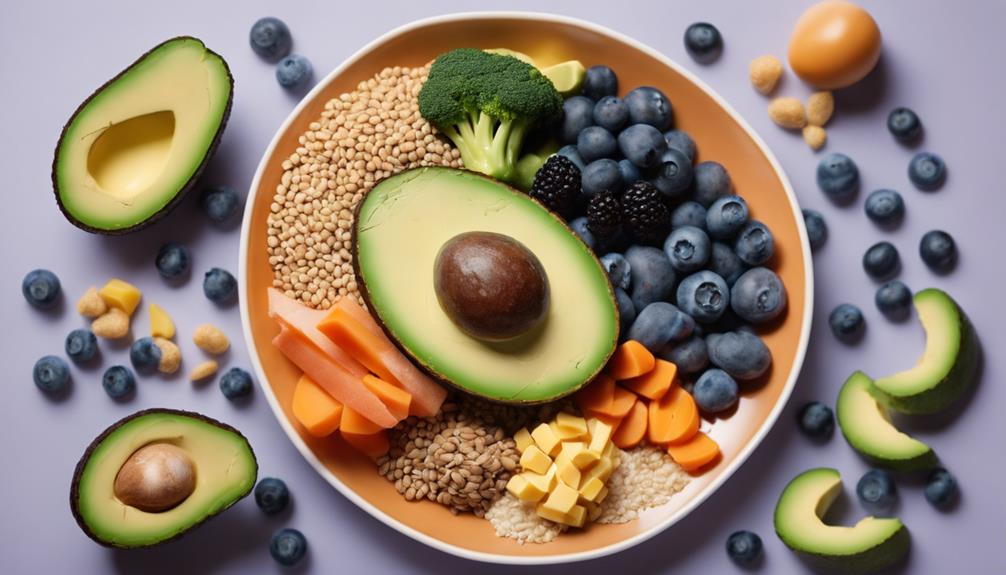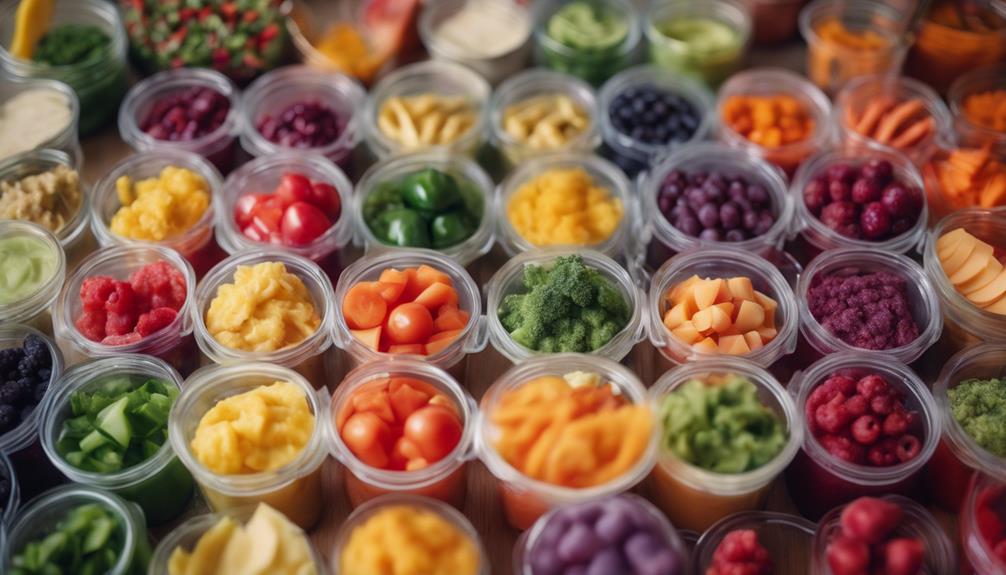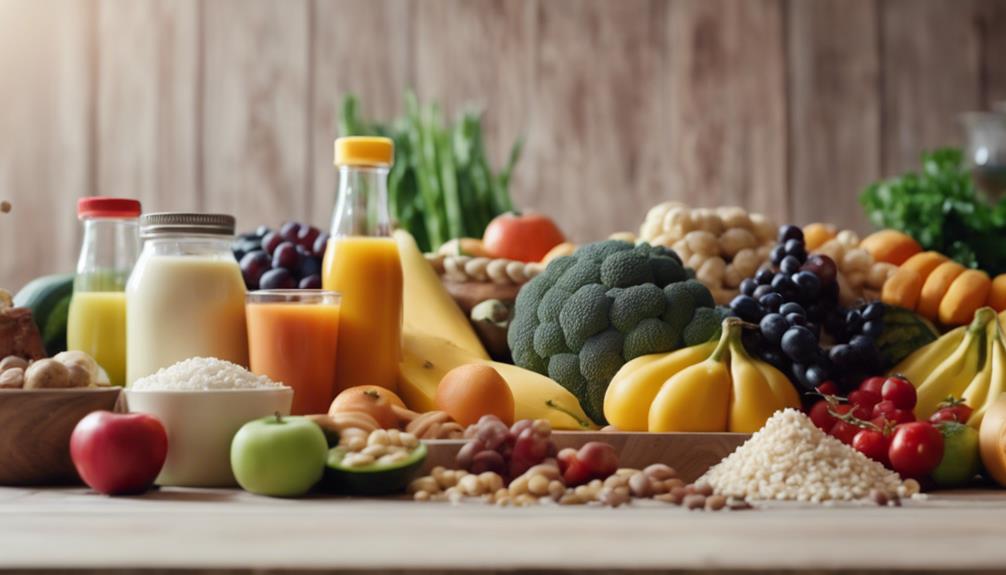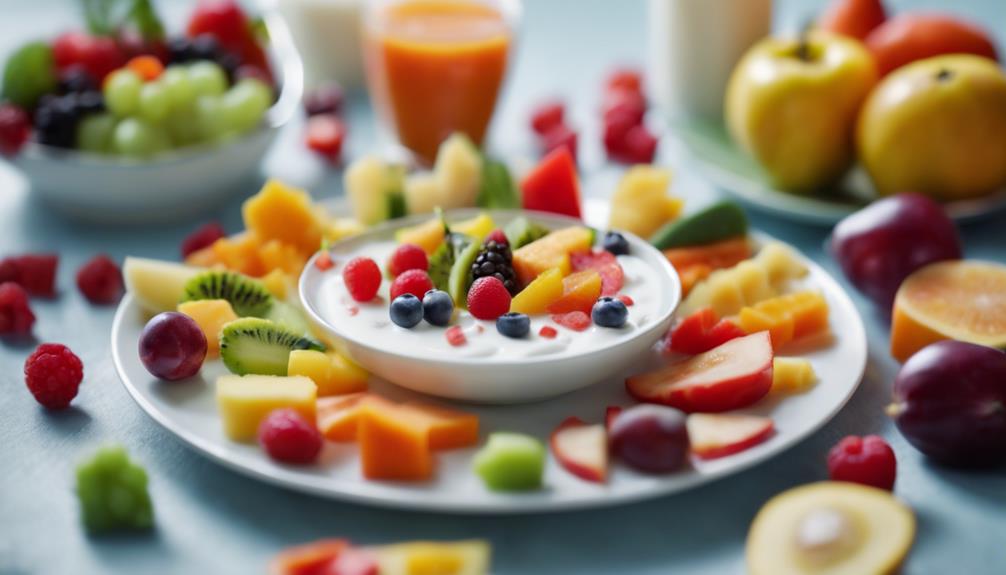Nourish your 2-year-old’s brain with nutrient-rich foods that are important for cognitive growth. Avocados provide healthy fats and B vitamins essential for brain health and cognitive function. Beets offer iron for oxygen transport to brain cells and support cognitive function. Chia seeds are rich in omega-3 fatty acids, enhancing memory retention and cognitive abilities. Cauliflower provides essential nutrients like vitamins C and K, while broccoli is packed with B vitamins and choline for memory development. Extra virgin olive oil introduces omega-3 and omega-6 fatty acids essential for brain function and overall health. Fuel your child’s brain development with these powerful foods.
Key Takeaways
- Avocado supports brain health with essential fats and B vitamins.
- Beets provide iron and B vitamins crucial for cognitive function.
- Chia seeds enhance memory retention with omega-3 fatty acids.
- Cauliflower offers vital nutrients like vitamin C and ALA for brain development.
- Broccoli is rich in B vitamins, iron, and choline for cognitive health.
Nutrient-Rich Avocado for Brain Health
Incorporate nutrient-rich avocado into your 2-year-old's diet to support their brain health and development. Avocado is packed with healthy fats that are essential for brain health, as well as B vitamins necessary for brain development in toddlers. These nutrients play a significant role in the development of the brain and nervous system, promoting cognitive function in your child. By including avocado in your toddler's diet, you're providing essential building blocks for their growing brain.
The healthy fats in avocado are important for the absorption of fat-soluble vitamins, further enhancing their benefits for brain health. This versatile fruit can be easily incorporated into your toddler's meals, offering a tasty and nutritious addition to their diet.
Supporting your child's brain development through foods like avocado can have long-lasting positive effects on their cognitive abilities and overall well-being. Make sure to include this nutrient-rich fruit regularly in your toddler's diet to help nurture their growing brain.
Iron and B Vitamins From Beets

Promote your 2-year-old's brain development by introducing beets into their diet for a rich source of iron and B vitamins. Beets are a powerhouse of nutrients essential for excellent brain development. Iron, abundant in beets, aids in the formation of hemoglobin, the protein responsible for transporting oxygen to the brain cells. This oxygen is crucial for the brain's energy production and overall function. Additionally, B vitamins found in beets play a key role in supporting cognitive function by assisting in the production of neurotransmitters, the chemical messengers that facilitate communication between brain cells. Including beets in your child's diet can ensure they receive these necessary nutrients for their growing brain. Below is a table highlighting the benefits of iron and B vitamins from beets:
| Nutrient | Role in Brain Development |
|---|---|
| Iron | Formation of hemoglobin for oxygen transport to brain cells |
| B Vitamins | Support the production of neurotransmitters for brain communication |
Cognitive Growth With Chia Seeds
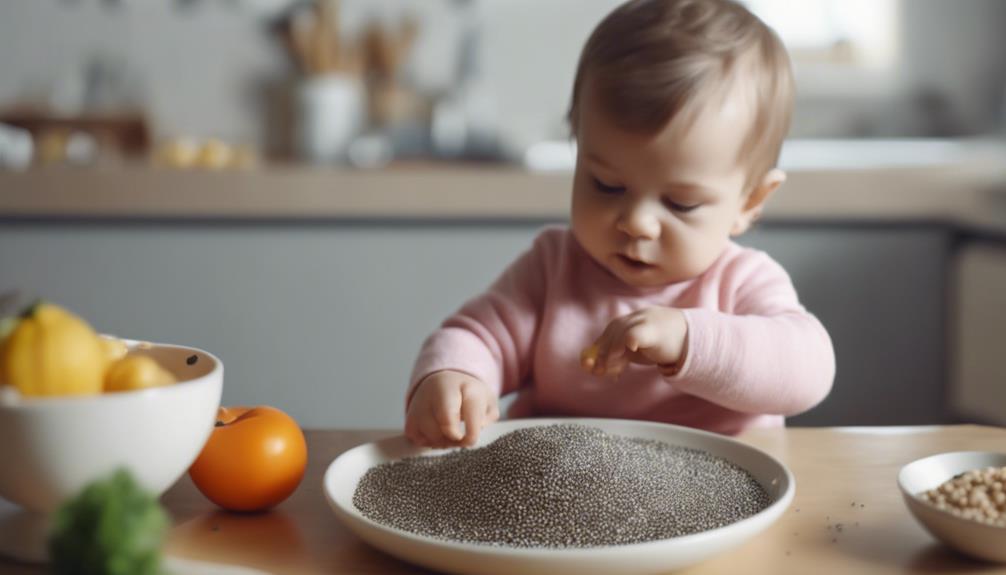
Chia seeds can play an essential role in your 2-year-old's cognitive growth.
These tiny seeds are rich in omega-3 fatty acids, crucial for memory retention.
Chia Seeds and Memory
Boost your 2-year-old's memory and cognitive growth with the remarkable benefits of chia seeds, a powerhouse of omega-3 fatty acids. These tiny seeds are packed with nutrients essential for brain health, including omega-3 fatty acids that enhance neural connections and improve cognitive function. By incorporating chia seeds into your child's diet, you can support their memory retention and learning abilities effectively. Additionally, the fiber content in chia seeds provides sustained energy, helping your little one maintain focus and concentration throughout the day.
Consider the following table to understand the key benefits of chia seeds for your 2-year-old's memory and cognitive development:
| Key Benefits | Chia Seeds |
|---|---|
| Omega-3 Fatty Acids | Promote cognitive growth and brain health |
| Fiber | Offers sustained energy for focus |
| Memory Retention | Supports learning abilities |
| Nutrient-Dense | Essential for optimal brain development |
Chia Seeds and Focus
Enhance your 2-year-old's cognitive growth by incorporating chia seeds into their diet, rich in omega-3 fatty acids essential for brain development.
Chia seeds play an important role in supporting focus and memory in young children, promoting overall brain function.
Here are four ways chia seeds can benefit your little one:
- Omega-3 Fatty Acids: Chia seeds are a potent source of omega-3 fatty acids, important for cognitive growth and brain development in 2-year-old babies.
- Improved Focus: The omega-3 fatty acids in chia seeds help enhance focus, enabling your child to concentrate better on tasks and activities.
- Memory Support: By including chia seeds in your 2-year-old's diet, you can aid in boosting memory retention and recall abilities.
- Antioxidant Power: Chia seeds are packed with antioxidants, which contribute to maintaining sustained focus and energy levels, essential for your toddler's overall cognitive growth.
Chia Seeds and Learning
Incorporating chia seeds into your 2-year-old's diet can greatly enhance their cognitive growth and learning abilities due to the rich omega-3 fatty acids content and other essential nutrients found in these tiny seeds. Chia seeds are known for their high levels of omega-3 fatty acids, which play a crucial role in cognitive development and brain health. These fatty acids are essential for improving learning abilities and supporting overall brain function. Additionally, the fiber content in chia seeds promotes healthy digestion and nutrient absorption, which are vital for optimal brain development in toddlers. By including chia seeds in your child's meals, you can help enhance their memory, focus, and cognitive growth. This nutrient-dense seed is a valuable addition to your toddler's diet, offering a wide range of benefits for their learning and brain function.
| Nutrient | Benefits |
|---|---|
| Omega-3 Fatty Acids | Enhances cognitive development |
| Fiber | Promotes healthy digestion |
| Nutrient Absorption | Crucial for brain development |
| Memory | Improved memory retention |
| Brain Health | Supports overall brain function |
Omega-3 Fatty Acids in Cauliflower

While cauliflower may not be a prominent source of omega-3 fatty acids, it offers a plethora of other essential nutrients such as vitamin C, K, and fiber, making it a valuable addition to your child's diet.
To enhance your 2-year-old's omega-3 intake, consider combining cauliflower with other foods rich in these fatty acids like salmon or chia seeds.
Nutrient-Rich Cauliflower Benefits
Cauliflower, though not a significant source of omega-3 fatty acids, contains ALA, a plant-based omega-3 that can be converted into EPA and DHA by the body. While cauliflower alone may not provide high levels of EPA and DHA essential for brain development, it plays a role in boosting overall omega-3 intake in a plant-based diet.
To enhance your toddler's nutrient intake and support brain development, consider incorporating a variety of omega-3-rich foods alongside cauliflower:
- Flaxseeds: Rich in ALA, flaxseeds are a great plant-based source of omega-3 fatty acids.
- Chia Seeds: These tiny seeds are packed with ALA and can be easily added to your child's meals for an omega-3 boost.
- Walnuts: Including walnuts in your toddler's diet provides a tasty way to increase omega-3 intake.
- Hemp Seeds: Hemp seeds are another excellent source of ALA, offering a nutty flavor and a nutritional punch.
Cauliflower Recipes for Toddlers
Boost your toddler's brain development with these flavorful cauliflower recipes rich in omega-3 fatty acids. Cauliflower is a powerhouse vegetable that supports cognitive function and brain health in toddlers.
Including cauliflower in your little one's meals can provide a nutrient boost essential for excellent brain development. To enhance your toddler's brain health, consider incorporating cauliflower into their meal preparation routine.
This versatile vegetable can be prepared in various ways such as roasting, steaming, or mashing, catering to your toddler's taste preferences. By introducing cauliflower recipes into your toddler's diet, you can help enhance their memory, focus, and overall brain function.
Make mealtime exciting and nutritious by exploring different cauliflower recipes that not only appeal to your toddler but also contribute to their brain development. Give your toddler's brain a healthy boost by adding cauliflower to their meals and nurturing their cognitive growth from an early age.
Brain-Boosting Broccoli Benefits

Incorporating broccoli into your 2-year-old's diet can greatly enhance their brain development due to its rich content of essential nutrients like B vitamins and iron. Broccoli is a powerhouse vegetable that offers a range of benefits for your toddler's cognitive health. Here's how broccoli can boost your child's brain development:
- B Vitamins: Broccoli is rich in B vitamins, including folate, which are essential for brain development in 2-year-old babies.
- Iron: The iron content in broccoli supports healthy brain function and cognitive development in toddlers.
- Choline: Broccoli contains choline, which aids in memory development and brain cell communication in 2-year-olds.
- Vitamin C: Broccoli provides essential nutrients like vitamin C, supporting the immune system and overall health in toddlers.
Extra Virgin Olive Oil for Development

To further enhance your 2-year-old's brain development, consider introducing Extra Virgin Olive Oil into their diet as a beneficial source of omega-3 and omega-6 fatty acids. These healthy fats are essential for brain development and function in your child.
The omega-3 fatty acids found in Extra Virgin Olive Oil play a critical role in building the brain's cell membranes and supporting proper brain function, while omega-6 fatty acids contribute to cognitive development.
Including this oil in your 2-year-old's meals can aid in enhancing memory, concentration, and overall brain health. Opting for Extra Virgin Olive Oil as a source of healthy fats provides a natural and nutritious way to support the ideal development of your child's brain.
Consider incorporating this brain-boosting oil into your little one's diet to promote their cognitive growth and support they receive the necessary nutrients for their brain's well-being.
Frequently Asked Questions
How Can I Help My 2 Year Old Brain Develop?
To help your 2-year-old's brain develop, provide a balanced diet rich in omega-3s, iron, and antioxidants. Include foods like eggs, dairy, whole grains, berries, lean meats, and beans. Remember to keep your child hydrated with water for peak brain function.
What Foods Are Good for Toddlers Brain Development?
To boost your toddler's brain development, include omega-3 rich foods like salmon and chia seeds, iron sources such as lean beef, choline-rich foods like eggs and avocado, whole grains, colorful veggies, and nutrient-packed options like yogurt, berries, and nuts.
What Food Is Essential for 2 Year Old Baby?
You need a balanced diet for your 2-year-old. Include omega-3 rich foods like salmon, iron sources such as lean beef, proteins from eggs, energy from beans, whole grains like oats for glucose, and antioxidant-packed berries and veggies.
What Are the Top 5 Brain Foods?
To boost brainpower, aim for salmon's omega-3, egg's choline, zinc, and iron from lean meat, dairy's calcium, and nuts/seeds for proteins and healthy fats. These top 5 brain foods are key!
Conclusion
To sum up, feeding your 2-year-old baby a diet rich in brain development foods such as avocados, beets, chia seeds, cauliflower, broccoli, and olive oil can provide essential nutrients for cognitive growth and overall health.
These ingredients serve as the building blocks for a strong foundation in brain development, ensuring your child receives the necessary nutrients for the best growth and development.
By incorporating these nutrient-rich foods into your child's diet, you're setting them up for success in the future.

